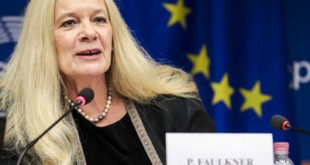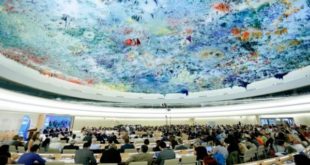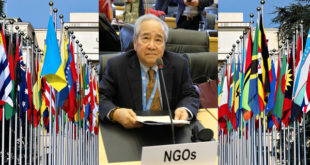
Speech of Võ Trần Nhật
Conference on Religious Freedom in Vietnam: Its Importance for Regional and Global Security (12 September 2016)
Hudson Institute, Center for Religious Freedom
September 12, 2016
Ladies and Gentlemen,
Very soon, Vietnam will adopt its first Law on Religion and Belief. Religious freedom will not benefit from it, for this law simply details or modifies the registration system of religious organizations already in force. In this system, you can practice your religion only if you are registered, and you are registered only if the government accepts your request. In the end, the government decides if you can practice your religion or not. This does not comply with international law, but it is the Communist Party’s policy, and it always has been.
On the contrary, the Unified Buddhist Church of Vietnam (or UBCV) advocates that everyone is entitled to enjoy religious freedom and all other human rights without interference from the government.
Buddhism came to Vietnam over 2000 years ago, and the majority of the Vietnamese are Buddhists. Vietnam has two main streams of Buddhism, Theravada and Mahayana, but the Mahayana school is predominant. Mahayana focuses on saving all the society, and has shaped Vietnamese Buddhism into an “Engaged Buddhism”. In Vietnamese history, each time oppression from inside or from outside the country threatened freedom and social justice, Vietnamese monks and nuns mobilized against it… then returned peacefully to their pagodas.
That’s why we can consider Buddhism as a matrix for the Vietnamese nation. Thanks to this “engaged Buddhism”, Viet people around the Red River Delta escaped assimilation to China despite 1000 years of Chinese occupation.
From the French colonial period up to the early 1960s, Buddhism was not entitled to function as a church in its own right, but was limited to the status of a mere association under Colonial Decree n°10. Buddhists were only able to officially establish the UBCV in 1964, after the abrogation of this Decree.
In 1975, after the end of the Vietnam war, Vietnam was reunified under Communist rule, and Hanoi’s leaders tried to dismantle all religions, especially Buddhism, which they considered (and still consider) a threat to their power.
They confiscated UBCV properties, burned religious books, arrested hundreds of nuns, monks and lay-Buddhists or forced them to join the army. Prominent dignitary Thích Thiện Minh was tortured to death; Thích Huyền Quang and Thích Quảng Độ were placed in solitary confinement…
But this terrible repression failed to destroy the UBCV. The communist regime realized that it could not eradicate religions, so it planned to control them. In 1981, the Communist Party created a State-sponsored Buddhist church – the Vietnam Buddhist Sangha (VBS), which became the only Buddhist association recognized by the government. All Buddhists were pressed to join it. Later, the same plan was used to fabricate other state-sponsored churches…
The main architect of that plan, communist religious official Đỗ Trung Hiếu, explained later that the creation of the State Church was not a Buddhist project but the work of the Communist Party alone and its aim was “to transform Vietnamese Buddhism into a tool of the Communist Party”. Indeed, among all the Buddhists who founded the State Church, there were no official representatives of the UBCV. The Party even forged a false UBCV seal and pretended that the UBCV was part of the State Buddhist Church.
This organization is truly a political tool: State Church officials are members of the Communist Party and some monks and nuns are even members of the National Assembly, in contradiction with their Buddhist monastic vows.
UBCV leaders and followers refused to accept this ban on their church, and kept up their activities despite repression: Thích Quảng Độ continued to publicly speak out for religious freedom, and in 2005 he set up a network of representative Boards to conduct educational, spiritual and humanitarian programmes for people in the poor provinces.
As Hanoi never succeeded in suppressing the UBCV, the Party has launched a new religious policy: Hanoi tolerates wider freedom of worship, but does not tolerate religious freedom. That means State pagodas can organize ceremonies but cannot make true religious teachings, nor preach on subjects not in line with Communist Party directives. This policy is smart: It gives the impression that Buddhists are free to practice their religion, but without true Buddhist teachings, this practice is only empty shell. As a result, religious practices become more and more like superstition, for people do not understand the real meaning of ceremonies or rites.
At the same time, the government has sent Security police to infiltrate false monks into pagodas, at least 3,000. They are policemen and watch everything from inside. Moreover, they adopt an improper behavior, trying to ruin prestige of the monks among the population.
Nowadays, religious persecution against Buddhists is less visible in Vietnam… but it is still terrible. In fact, Vietnamese authorities use what we call “stealth repression”: Buddhists are not put on trial or detained in official prison, but suffer harsh harassment on a daily basis.
They are denied the right to travel, routinely summoned for police interrogations, subjected to intimidation, public “denunciation sessions” and expulsion from their Pagodas. Police hire thugs to assault them and vandalize their properties. To punish UBCV followers, local authorities refuse to deliver mandatory residence permits (hộ khẩu), expel Buddhist children from school or make people lose their jobs. In many UBCV pagodas, celebrations of Buddhist festivals are prohibited.
In this perspective, the current Patriarch of the UBCV Thích Quảng Độ, who is 88 years old, is a symbol: He has been detained for more than 30 years because during his whole life, he has advocated peacefully religious freedom and human rights. He has been detained in various forms, and is now under house arrest in Saigon. He is deprived of his citizenship rights and unable to travel or communicate freely. Sometimes the authorities allow diplomats to meet him. Very recently, Western diplomats told us off-the-record that the authorities had informed them that Thích Quảng Độ was forbidden to preach because he belonged to a “non-recognized” religion.
The Buddhist Youth Movement is also victim of persecution. This organization affiliated to the UBCV has a membership of over 300,000 young Buddhists in Vietnam. Since 2014, over 100 members have been placed under house arrest. Its Head, Lê Công C?u, is subjected to continuous harassments, threats and Police interrogations. In May, for example, during the visit in Vietnam of President Obama, Police confined Lê Công C?u at home to prevent him from visiting Thích Quảng Độ in Saigon.
I would like to conclude with the following observations:
Repression against UBCV is unlikely to end. The UBCV is a strong popular movement, and Thích Quảng Độ says there can be no religious freedom without human rights and democracy. However the one-Party State does not tolerate dissent and Hanoi has stated clearly that it will never legalize the UBCV if Thích Quảng Độ remains at its head.
The future Law on Religion and Belief has been conceived to enforce State control on religions, and it will be used by the Communist Party to re-enforce its power. Indeed, Vietnam’s aim is not to implement the rule of law but the rule “by” law, by adopting a series of laws restricting the exercise of human rights and “legalizing” arbitrary repression. The Law on Religion and Belief is one of them.
Moreover, this Law is a trap for religions.
Non-registered organizations are not allowed to practice religion. There is no religious freedom for them.
Religious groups which agree to be registered have to accept the total control of the Communist Party over their organization, their activities, the content of their teachings, their leadership and membership. There is no religious freedom for them either.
In the end, applying for registration means renouncing the right to religious freedom. That’s why the Supreme Patriarch of the UBCV, Thích Quảng Độ, has made it very clear that the UBCV will never apply for registration as long as he is its leader.
Thank you for your attention.
Võ Trần Nhật
Executive Secretary
Vietnam Committee on Human Rights
 Quê Me Quê Me: Action for democracy in Vietnam & Vietnam Committee on Human Rights
Quê Me Quê Me: Action for democracy in Vietnam & Vietnam Committee on Human Rights



